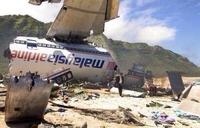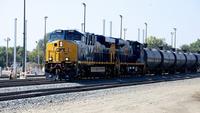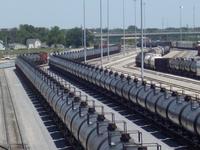-
Forensic technology could help U.S. prove case against Russia, Ukrainian separatists

Over the weekend, U.S. Secretary of State John Kerry appeared on several media outlets to make a case against Russia for the country’s support of pro-Russian separatists responsible for the downing of Malaysia Airlines Flight MH17. The United States is confident that rebels attacked the airplane with an SA-11 Gadfly 9K37M1 Buk-1M fired missile. For the United States to prove its allegations against Russia and the Ukrainian separatists, Western authorities must first gain full access to the crash site, utilize an arsenal of forensic investigative technology, then gather eye witness accounts. Once the United States can prove its allegations, European partners can then be persuaded to impose tougher sanctions on Russia.
-
-
Tiny laser sensor increases bomb detection sensitivity
New technology under development could soon give bomb-sniffing dogs some serious competition. A team of researchers has found a way dramatically to increase the sensitivity of a light-based plasmon sensor to detect incredibly minute concentrations of explosives. The researchers noted that the sensor could potentially be used to sniff out a hard-to-detect explosive popular among terrorists. The sensor also could be developed into an alarm for unexploded land mines that otherwise are difficult to detect, the researchers said.
-
-
Kerry: All evidence points to separatists; Russia should “step up”
U.S. secretary of state John Kerry said on Sunday that all the evidence related to the downing of Malaysian passenger plane clearly pointed to Ukrainian separatists as the culprits. Kerry appeared on all five major Sunday talk shows to present the administration’s case against the separatists – and Russia — and to call on Russia to pressure the separatists to stop removing key pieces of evidence from the crash scene and stop blocking an investigation into the firing of a surface-to-air missile which brought down the jetliner.
-
-
Malaysian jetliner shot down by pro-Russian Ukrainian separatists
Nine Britons, 23 U.S. citizens, and 80 children are reported to be among the 283 passengers and fifteen crew members killed when an anti-aircraft missile launched by pro-Russian separatists in east Ukraine brought down a Malaysian Airline Boeing 777-200 on its way from Amsterdam to Kuala Lumpur. The plane fell to Earth near the town of Grabovo, about fifty kilometers from the Russia-Ukraine border. The Ukrainian government said the plane was shot down by the Russian Buk missile system as the liner was flying at an altitude of 10,000 meters (33,000 feet).
-
-
Iowa to allow public release of information about trains carrying crude
Iowa officials have announced that they will alert the public about trains carrying one million gallons or more of “extra-flammable” crude oil throughout the state — despite the argument of railroad companies that the information could pose a security threat. Iowa’s decision places the state in the spotlight as a possible model for how the rulings will proceed in the rest of the country.
-
-
Heavier oil train traffic in western U.S. causes safety worries
In May, following extensive debate regarding security concerns, U.S. Transportation Secretary Anthony Foxx ordered railroads to share oil train shipment information with states, in order better to inform first responders should an accident occur. In the first quarter of 2014 alone, there were 110,000 carloads of oil. Each train can carry three million gallons of oil.
-
-
Details of oil shipments by rail are not security sensitive and should be released: DOT

The boom in U.S. oil shipments by rail is largely due to the growing production of shale oil from the Bakken fields in North Dakota and Montana, but also due to the slow construction of new oil pipelines. U.S. freight railroads are estimated to have carried 434,000 carloads of crude oil in 2013, compared to 9,500 carloads in 2008. In 2014, 650,000 carloads of crude oil are expected to be carried. So far U.S. crude oil shipments by rail have reached a record 110,000 carloads in the first quarter of 2014. Transportation Secretary Anthony Foxx issued an order in May for railroads to provide states with details on routing and oil-train volumes. Last week, U.S. Department of Transportationofficials affirmed that details about volatile oil train shipments are not sensitive security information, thereby allowing states to release such information to the public.
-
-
IT security at U.S. ports weak: GAO
The Government Accountability Office (GAO) reports that maritime security policies and plans at three high-risk U.S. ports do not effectively address how to assess, manage, and respond to cybersecurity threats. While all three ports have strategies to deal with physical security, there were few policies that specifically addressed cybersecurity.
-
-
Feds, rail operators, Washington State embroiled in crude oil shipment disclosure dispute

Last month the U.S. Department of Transportation(DOT) ordered rail carriers with trains carrying crude oil to notify state officials in the states through which the trains pass about the volume, schedule, and routes of these trains. The amount of crude oil transported by trains has grown dramatically – from 6,000 carloads in 2005 to more than 400,000 carloads in 2013. The increase in the volume of crude oil shipping has been accompanied by a sharp rise in the number of accidents and derailments. DOT’s order was meant to allow states’ first responders to be prepared, but the railways treat shipping information as “security sensitive” and refuse to share it with states’ officials unless the information is distributed to emergency response groups for planning purposes only. Washington State says that state laws require that such information be made public.
-
-
China implements airport-like security checks at crowded train stations
China’s terrorism problem is worsening as a growing Uighur-led Islamist militancy has emerged in response to the Chinese government’s tough stance on ethnic problems in the Uighur homeland of Xinjiang in west China. In response to the growing security risks, Beijing passengers are now subject to security checks before their train commute.
-
-
U.K. forwarders “not surprised” by U.S. climb-down on 100 percent container scanning
One leader of the international freight industry says it was “hardly surprising” to hear the recent news that the United States has delayed new rules requiring all cargo containers entering the United States to be security scanned prior to departure from overseas for two more years, amid questions over whether this is the best way to protect U.S. ports.
-
-
Airports resist bolstering perimeter security because of cost
Last month’s security breach at Mineta San Jose Airport, in which a teenager entered the airfield and hid in the wheel well of a Maui-bound flight, has highlighted concerns about the security of airport perimeters. Perimeter intrusions are common at airports, but airports resist pressures to improve perimeter protection because of the costs involved. Experts note that if we were to string all of the U.S. airport perimeters together, we would approach the length of the U.S. border with Mexico and security expenditures approaching a billion dollars. These experts say that airports are not likely to invest heavily in perimeter security until a serious disaster due to lax perimeter security occurs. “Show me a body count, and we’ll build a fence,” said one airport administrator.
-
-
Port security technologies demonstrated in Gothenburg, Sweden
FOI, the Swedish Defense Research Agency, conducted a demonstration in Gothenburg of technology designed to improve the security of ports around the world. One of the reasons for the research into countering intrusion is that many ports find that they lack good and affordable tools for seaward surveillance, and so find it difficult to guard against terrorist attack and organized crime such as theft, smuggling, and stowaways. FOI has, therefore, created a system that is capable of detecting divers, swimmers, or small craft which might attempt to approach the quayside or a vessel tied up alongside.
-
-
New way to lower risk of midair collisions for small aircraft
Researchers have developed new modifications for technology that helps pilots of small aircraft avoid midair collisions. The modified tools significantly improved pilot response times in making decisions to avert crashes. At issue are “cockpit displays of traffic information” (CDTIs). These are GPS displays used by private pilots to track other aircraft in their vicinity. However, pilots often focus on the closest aircraft on the display — a habit that can pose a significant hazard.
-
-
Converting light to sound for better weapons detection, medical imaging
A device that essentially listens for light waves could help open up the last frontier of the electromagnetic spectrum — the terahertz range. So-called T-rays, which are light waves too long for human eyes to see, could help airport security guards find chemical and other weapons. They might let doctors image body tissues with less damage to healthy areas. They could also give astronomers new tools to study planets in other solar systems. Those are just a few possible applications.
-
- All
- Regional
- Water
- Biometrics
- Borders/Immig
- Business
- Cybersecurity
- Detection
- Disasters
- Government
- Infrastructure
- International
- Public health
- Public Safety
- Communication interoperabillity
- Emergency services
- Emergency medical services
- Fire
- First response
- IEDs
- Law Enforcement
- Law Enforcement Technology
- Military technology
- Nonlethal weapons
- Nuclear weapons
- Personal protection equipment
- Police
- Notification /alert systems
- Situational awareness
- Weapons systems
- Sci-Tech
- Sector Reports
- Surveillance
- Transportation
Advertising & Marketing: advertise@newswirepubs.com
Editorial: editor@newswirepubs.com
General: info@newswirepubs.com
2010-2011 © News Wire Publications, LLC News Wire Publications, LLC
220 Old Country Road | Suite 200 | Mineola | New York | 11501
Permissions and Policies
Editorial: editor@newswirepubs.com
General: info@newswirepubs.com
2010-2011 © News Wire Publications, LLC News Wire Publications, LLC
220 Old Country Road | Suite 200 | Mineola | New York | 11501
Permissions and Policies
